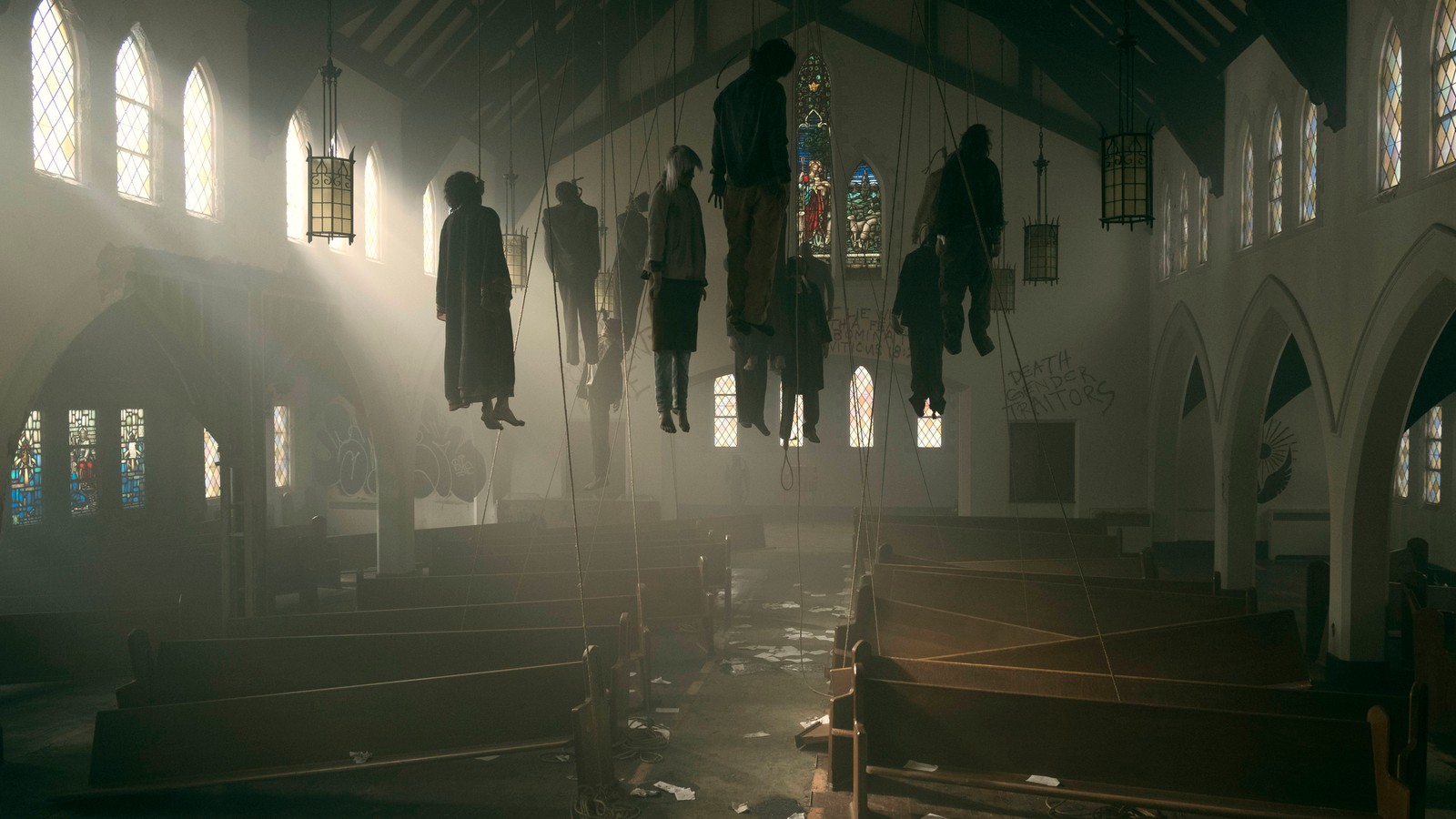We Finally Know Where Luke’s Been on ‘The Handmaid’s Tale’

At the end of “A Woman’s Place,” Offred found out that, contrary to what she’d thought all this time, Luke hadn’t been killed—he was safe across the border and looking for her. In “The Other Side,” we see he went through 28 Days Later to get there.
That makes sense, really. The reasons 28 Days Later has made such an impact on modern horror has nothing to do with the zombies—it touches on deeper fears than just its hyperactive runners and gory surprises. 28 Days Later knew the terror of being alone, the terror of being trapped and hunted, the terror of being too tired to outrun a tireless enemy, the terror of your home turning on you. (The only monsters in the movie are the soldiers who broadcast a message of heaven to lure women close enough to capture.) It even manages to acknowledge the bizarre terror of missing something terrible.
That is a particularly interesting as marker of trauma: Not knowing is an agony of its own. Hearing about something terrible happening carries the veneer of the surreal with it, and sometimes the helplessness of distance can go sour. When Luke’s trying to crawl out of the bus for his family, it isn’t because he thinks there’s anything he can do; it’s just that perverse instinct to be closer to something awful, so at least he’ll know what’s happening.
That can be an odd line to walk, but in the moment, it’s easy to forgive. Luke’s escape is absolutely drenched in what he’s missing—an uneasy urgency that throws itself back and forth in time, as we see how close they came to getting out, and how close he came to dying, trying.
Until now, The Handmaid’s Tale has offered up a retro dystopia, with a world so small you can hardly breathe. Even Luke’s flashbacks to the Before are full of old friends of the family and called-in favors from the old days. But in the most immediate timeline, Luke’s in an overtly post-apocalyptic landscape: unmarked, abandoned, and barren. The last evidence of his family—a shoe, a stuffed animal—pockmark the woods like the last artifact of human habitation. The crew that finds him trawls for refugees in a repurposed bus and scavenges for food in the wreckage of abandoned towns.
More than just an homage to 28 Days Later, this episode provides the visual gulf between Offred and Luke. Offred’s surrounded by people and buildings and gates; Luke’s alone in a world that seems to have been torn down overnight. When America fell, it fell hard. One hesitates to imagine the width of Gilead’s militarized border.
And speaking of borders, fake passports, and Little America springing up in Toronto, this episode’s clearly trying to capture the strain and helplessness of being a refugee.
As a wider statement, I’m not sure how well it would work. This series treats a lot of aspects of American dystopia as “What if other countries, but too much?” which gets awkward in a hurry. On the other hand, maybe it’s just as well the show knows its prime audience is the sort that needs to be shaken by such thought exercises. (It helps that the overall tone of the episode is that this escape attempt is a lot more surprising for the family than it is for us.)
They realize their helplessness as they rely on old friends, a lucky break, a sympathetic neighbor with a connection up north (if you can trust him), a lucky break, a fake passport in time to cross the border, a lucky break, a lucky break, a lucky break. Succeeding means arriving in a new country with nothing, and hoping there’s a place for you, knowing you can’t go back.
Except Luke, of course. I expect we know where he’s going.
Before We Go
- The horrible, gnawing dread of Too Late undercuts every step of their escape. (“When I lost my job, we should have left then,” she snaps, angry at everything and trying not to look terrified where Guardians can see.)
- That accidental family portrait at the end of a dock with nowhere to hide, the barrel of a shouldered rifle pointing to them like the finger of a Renaissance saint, is a stunner shot from director Floria Sigismondi.
- Too Close Award: “US passport doesn’t mean shit any more, bud. That’s over.”
- Interesting framing of group trauma emerging. We’ve spent several episodes on the horrors of being a Handmaid, but also on the lines of communication and the tiny acts of resistance they share. The Handmaid-in-training who escapes the Red Center is mute; how can one explain to those who weren’t there?
- We don’t know exactly how long it was between women losing their jobs and the family making a run for the border, but almost everything we see of Gilead has been overlaid on America in three years. (This isn’t a note about how that doesn’t seem like enough time; these days, we know better how long it takes to make bad things happen suddenly. Gut voting rights for a decade and get our current GOP Congress. Gilead didn’t crash into a functioning system; it broke the system quietly, and then applied pressure.)
- I had a note here until the final seconds of the episode that it was the first in which Offred doesn’t appear; she exists in Luke’s flashbacks, and beyond that he has no idea what’s happened to her. While I understand why the episode loops Offred into the tag—likely passing the narrative baton, among other things—it would have been something to have an episode in which she only exists as a scribbled note and a vast unknown.
This is an archived copy of an article originally published here at VICE.com.

